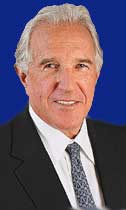
Stanley Weiss
Stanley Weiss, a global mining executive and founder of Washington-based Business Executives for National Security, has been widely published on domestic and international issues for three decades.
 In the House of Commons this past Tuesday, British Foreign Secretary Philip Hammond made two announcements pertaining to Saudi Arabia that sounded like they came straight out of the ninth century. The first was that thanks to British diplomacy, Hammond did "not expect" that a young political activist named Ali Mohammed al-Nimr - who had been sentenced by a Saudi court to "beheading and crucifixion" for the crime of attending a pro-democracy rally when he was 17 years old - would be put to death after all. The second was that a 74 year-old British grandfather named Karl Andee - an asthmatic, three-time cancer survivor living in Saudi Arabia who has spent the past year in jail for the crime of possessing homemade wine - would likely be spared the 350 lashes to which he had also been sentenced and which his children feared would surely kill him.
In the House of Commons this past Tuesday, British Foreign Secretary Philip Hammond made two announcements pertaining to Saudi Arabia that sounded like they came straight out of the ninth century. The first was that thanks to British diplomacy, Hammond did "not expect" that a young political activist named Ali Mohammed al-Nimr - who had been sentenced by a Saudi court to "beheading and crucifixion" for the crime of attending a pro-democracy rally when he was 17 years old - would be put to death after all. The second was that a 74 year-old British grandfather named Karl Andee - an asthmatic, three-time cancer survivor living in Saudi Arabia who has spent the past year in jail for the crime of possessing homemade wine - would likely be spared the 350 lashes to which he had also been sentenced and which his children feared would surely kill him.
For those not up on their medieval execution methods, one story helpfully explained that had the sentence against Al-Nimr been carried out, the Saudi way dictates that his head would have been cut off with a sword, and then his headless body would have been publicly displayed as a lesson to others who would dare challenge the Saudi monarchy. Meanwhile, anArab News columnist reflected on the grandfather's case without a trace of irony, noting that while it is well-known that "alcohol is hazardous to health," 360 lashes with a long, hard cane is "not a matter of inflicting pain but more of a moral punishment" - because, according to the Saudi way, "lashing is done through a careful procedure," with the "elbow planted firmly to the side," and with "only the quick movement of the hand from the wrist. It is not the pain," he clarified, clearly never having felt 350 lashes. "It is the shame."
Somehow lost in translation was that Saudi Arabia should feel any shame for continuing to practice a kind of daily, institutional barbarism - guided by a strain of sharia law rooted in the ultra-extreme Wahhabi form of Sunni Islam - that matches the stomach-turning public atrocities committed by the jihadists of the Islamic State of Iraq and Syria (ISIS). This is a nation that reportedly beheaded 90 people last year and more than 100 so far this year. It is a country in which victims of gang rape have been sentenced to prison and 200 lashes; in which an acceptable punishment for women accused of adultery is to bury them in the ground to their head and then allow a circle of men to stone them to death; in which women aren't allowed to work, travel, drive or even leave the house without permission from their male "guardians."
And yet, for more than half a century, Saudi Arabia's appalling human rights record has been given a free pass by the planet's foremost advocate for human rights, the United States. In fact, while both al-Nimr and Andee languished in jail cells in September, Saudi Arabia's new monarch, King Salman bin Abdulaziz Al Saud, was welcomed to the Oval Office. While there, he and United States President Barack Obama engaged in what the White House later called "a positive and fruitful discussion" about "the enduring relationship between their countries" - a relationship Obama has called "extraordinary," going so far as to bow to then-Saudi leader King Abdullah at a G20 summit in 2009.
But the time has come for America to reevaluate its relationship with Saudi Arabia. As tensions between Islamic fundamentalism and the West grow deeper, the U.S. can no longer overlook Riyadh's primary role in bankrolling and nurturing the most virulent forms of Islamic extremism around the world. While global attention is increasingly fixed on the evolving battle lines that Sunni Saudi Arabia and Shia Iran are drawing in conflicts across the Middle East today, it's time we admit that our long-time "friends" in Riyadh are actually the greatest enemies of democracy and modernity in the world today -- give or take the ayatollahs in Iran.
It would have been hard to see this day back in 1931, when the relationship between the two nations began when a young Vermont mining engineer named Karl Twitchell was invited to Saudi Arabia to search for water sources. While Twitchell was combing the Arabian Desert, a California oil company had begun prospecting for oil--successfully--in adjacent Bahrain. Twitchell noted remarkable similarities between the Bahraini site and a location in Eastern Saudi Arabia. In 1933, Saudi King Ibn Saud granted a concession to Standard Oil of California, with Twitchell as one of the company's negotiators. They struck oil in 1938.
None of that would have mattered, however, had Japanese planes not attacked Pearl Harbor on December 7, 1941. Convinced of oil's strategic significance for the allied war effort, President Franklin D. Roosevelt moved quickly to secure its resources. He established an embassy in Riyadh in 1942 and authorized financial assistance the next year. In 1945, aboard the USS Quincy in the Suez Canal, Roosevelt and Ibn Saud reaffirmed America's commitment to its partner in the Middle East.
If World War II gave birth to the U.S.-Saudi alliance, the Cold War is when the alliance grew up. As a religious state, the Kingdom feared Soviet influence--and its efforts to spread atheistic communism--as much as the U.S. did. In 1951, U.S. Secretary of State Dean Acheson called King Ibn Saud "the best friend the United States has in the Middle East." That same year, both countries signed a mutual defense agreement. The ties between Washington and Riyadh became so strong that by 1979, members of the Saudi cabinet had more doctorates from U.S. universities than President Jimmy Carter's cabinet.
But as Saudi oil revenue soared in the 1970s, they quietly began a separate mission: to fund the creation of religious schools - calledmadrassas - devoted to exporting the fundamentalist Wahhabist interpretation of Islam throughout the Muslim world. Unlike the other clear threat in the region, Iran--whose hostility toward the West and support of terrorism has been much louder and more overt since its Islamic revolution in 1979--Saudi Arabia's was much quieter, but no less effective.
Developed in the 18th Century, Wahhabism is a strain of Islam that advocates the strictest interpretation of the Koran, rejects modernity in all forms, and promotes, in the words of Saudi Muslim scholar Ahmed Ali, that any non-Wahhabis (including Christians, Jews, and Shiite Muslims) "be hated, be persecuted, even killed." As Ali describes it, a book printed by the Saudi Ministry of Education and distributed to ninth graders, for instance, reads "the day of judgment will not arrive until Muslims fight Jews, and Muslims will kill Jews."
Over the past three decades, Saudi Arabia has reportedly spent as much as $200 billion promoting Wahhabism in Muslim nations worldwide. In the process, it has become the religion of violent Islam, described as "the Fountainhead of Islamist Terrorism." It is no accident that 16 of the 19 hijackers on 9/11 were Saudi practitioners of Wahhabism. The late Pakistani Prime Minister Benazir Bhutto--herself killed by extremists--once attributed the rise of fundamentalist Islam to "the Saudi-fundedmadrasahs that were rapidly replacing the ineffective public schools in her country." No less an authority than former U.S. Secretary of State Hillary Clinton was quoted in a Wikileaks cable in 2009 saying that "donors in Saudi Arabia constitute the most significant source of funding to Sunni terrorist groups worldwide ... a critical financial support base for al-Qaeda, and other terrorist groups." But since Saudi Arabia is America's good friend, the U.S. has turned a blind eye to it all.
Instead, Washington has chosen to focus on the places where Saudi and U.S. interests still overlap. As former Clinton and Obama Administration foreign policy expert Bruce Riedel has argued, "Saudi assistance helps our allies like Jordan and Morocco. Saudi intelligence was key to foiling the last two al-Qaeda plots to attack the American homeland and is critical to the battle in Yemen against the terrorists. Saudi Arabia is also central to keeping pressure on Iran."
At the same time, Saudi Arabia has also become much more public in disrupting the very kinds of democratic reforms that the U.S. has advocated in the Middle East. Riyadh continues to support Taliban forces in Afghanistan, who are slowly working in the absence of U.S. troops to reverse that country's democratic gains. It has undertaken military operations in Bahrain and Yemen, as American scholar Ted Galen Carpenter has argued, "eliminating the possibility of peaceful solutions to the bitter domestic divisions in those countries." As Riedel has said, "the Saudis have also led the counter revolution to the Arab Awakening" strongly voicing its disapproval that the U.S. sat passively by while longtime Egyptian dictator Hosni Mubarak fell. It subsequently backed the military coup that ousted the democratically elected Egyptian government, and has since worked to assist the current military government crackdown on the Shia members of the Muslim Brotherhood. And, of course, the Saudi government helped bankroll and arm the Sunni jihadists in Syria and Iraq that became ISIS.
The nuclear agreement between the U.S. and Iran, as well as the weak U.S. support for ousting Syrian President Bashar al-Assad, have both earned the open scorn of Saudi Arabia--prompting Saudi King Salman to withdraw from an Arab summit with President Obama at the last minute last May.
That's just as well. With the U.S. now the world's largest producer of oil - passing none other than Saudi Arabia - we no longer need to look the other way. We should begin holding Saudi Arabia, which comically sits on the United Nations Human Rights Council, to the same standards we hold other nations and begin calling the Kingdom out on its human rights abuses, suppression of women, and support for extremism. Having supplied nearly $100 billion in military aid to the Saudis, it's time America conditions any future assistance on reforms that pull Riyadh - and its violent worldview - out of the ninth century.
Shortly before the attacks of 9/11, frustrated by America's reluctance to stop Israel's crackdown of the Saudi-supported Palestinian intifada, then Saudi Crown Prince Abdullah wrote an angry letter to U.S. President George W. Bush warning that "a time comes when peoples and nations part. It is time for the United States and Saudi Arabia to look at their separate interests." I couldn't have said it better myself.



.jpg/250px-ElbeDay1945_(NARA_ww2-121).jpg)





